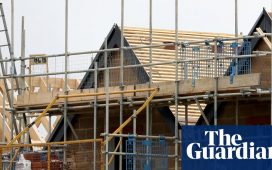Changes to England’s planning rules introduced by the ruling Conservative party last December are already causing local councils to cancel housing developments.
The reforms to the National Planning Policy Framework (NPPF) introduced by Michael Gove at the Department for Levelling Up, Housing and Communities removed mandatory house building targets and reduced the amount of land supply some councils need to allocate for housing.
The change came after backbench Conservative MPs opposed to housing developments constituencies pressed for the targets to be watered down.
In an early sign of the impact, Wiltshire council in south-west England this month rescinded initial approvals that it had granted last November for three housing projects covering nearly 200 houses.
Calling the government’s reforms a “grubby concession” to backbenchers who want to block housing development, Matthew Pennycook, shadow housing minister, has pledged that Labour would enact “mandatory targets that bite on individual local planning authorities” if it came to power.
The issue of housing and planning is set to be a point of contention in this year’s general election, with the Centre for Cities think-tank estimating that the UK has a historical backlog of 4mn unbuilt homes, with an average house in England now costing more than 10 times the average salary.
In its 2019 manifesto the Conservative party committed to building 300,000 homes a year by the mid-2020s, but has failed to achieve the target.
The Home Builders Federation trade body said 60 local authorities had paused or withdrawn their local plans since the prospect of changes to the NPPF was first raised in late 2022. It warned that the changes would allow anti-development councils to build less.
“The politically driven weakening of the planning system will impact housing supply for years to come and needs to be urgently reversed,” said Stewart Baseley, HBF chair.
Minutes of Wiltshire council’s planning committee meeting on March 6 explicitly cite the December 2023 changes to the NPPF as the reason for reversing its planning decisions, adding that technical assessments of the suitability of the sites had not changed.
The scrapped plans included a development of 145 homes with a community orchard and children’s play areas on farmland on the outskirts of the market town of Westbury; and 53 houses, including social housing, on the edge of Melksham, another small town.

In a statement Wiltshire council, which is Conservative-controlled, said the decision to overturn the approvals was taken because “material changes” to the NPPF in December meant it was no longer required to approve the developments, which had been set for areas of farmland.
Planning specialists said the Wiltshire decision was likely to be repeated across other councils as the effects of reforms feed through.
Lawrence Turner, planning director at Boyer Planning, who worked on one of the newly rejected Wiltshire sites, said two other applications had been similarly knocked back in other regions.
He said that councils had spent years working out the details of such sites with developers in order to meet their housing obligations, but the NPPF changes allowed authorities to “take your foot off the gas, essentially”.
Matthew Tucker, senior associate at Burges Salmon, a Bristol-based law firm that advises property developers and local authorities, said about 40 per cent of councils would be able to take advantage of the relaxed rules.
“There are quite a few authorities with borderline cases where the position in the week before the changes were announced is different to the position thereafter,” added Tucker.
Paul Breen, managing director of Living Space Housing, which had an affordable housing development rejected in Wiltshire, said it plans to appeal against the council’s decision citing the “acute” need for affordable homes in the county.
“The new NPPF introduces a greater number of measures for local authorities to be able to resist new housing development even when there is a clearly identifiable need,” he said.
The Gove reforms also reduce imperatives for councils to authorise building on protected rural “greenbelt” land in order to meet housing numbers, leading some councils to reverse plans to build homes in rural areas.
North Somerset council in the south-west of England, which is led by a Labour and Liberal Democrat coalition, scaled back plans for nearly 3,200 homes on greenbelt land that had been provisionally agreed in 2022, when the government indicated that councils “should not be compelled to release greenbelt to meet housing needs”.
Matt Griffith, director of policy at Business West, the regional chamber of commerce, said councils were reacting to the political messaging of lower housebuilding ambitions, even though they privately recognised the need to build more homes.
“People say that the planning system isn’t responsive. Unfortunately this isn’t the case if the government sends out the signal that it plans to go easy on housing numbers or decisions involving the greenbelt,” he added.
The levelling up department said the NPPF retained a “strong expectation” that authorities would plan positively for the housing needed in their areas.
“December’s changes allow for a slight reduction in land supply where plans are being updated, so that communities are less at risk from speculative development while new plans are put in place,” a spokesperson added.











